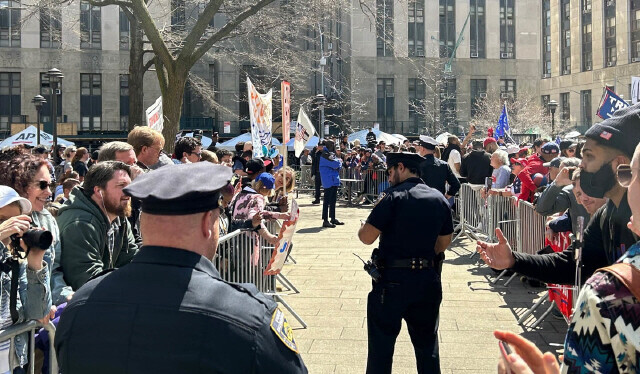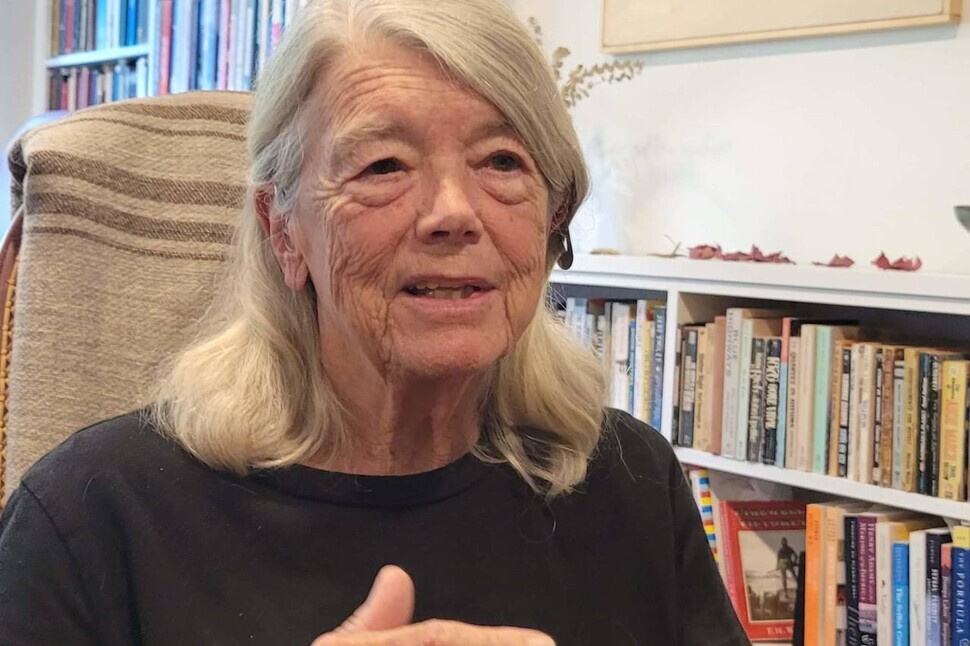hankyoreh
Links to other country sites 다른 나라 사이트 링크
Political polarization is product of inequalities caused by expanding markets, says theorist

Editor’s note: The leader of South Korea’s main opposition party went on a hunger strike, a motion consenting to his arrest was passed by the National Assembly, which led to a protest by his supporters, and a warrant for his arrest was requested and then subsequently rejected. The intense political confrontation currently unfolding in Korea is not unusual, however. Even in the United States, which has long portrayed itself as a bastion of democracy, the Capitol was overtaken by rioters three years ago, and a former president is now under indictment. We are witnessing the rise of a climate where political opponents are increasingly seen as “enemies.” This crisis of democracy, intertwined with challenges like a struggle for global hegemony, wars, and inflation, is exacerbating public unease. In light of these developments, the Hankyoreh is publishing a series of articles in anticipation of the Asia Future Forum, which will be held on Wednesday, Oct. 11. The pieces in this series will delve into the root causes of these crises and explore potential solutions, in line with the forum’s theme: “The Age of the Polycrisis: A Way to Coexistence.”
Jane Mansbridge is a brilliant theorist of democracy who was awarded the Johan Skytte Prize five years ago, an honor considered tantamount to a Nobel prize in the political science world. The Harvard Kennedy School professor emerita previously served as president of the American Political Science Association.
Ahead of Mansbridge’s upcoming keynote presentation at the Asia Future Forum on Oct. 11 on the topic “The Deepest Foundations of our Democratic Crisis,” the Hankyoreh sat down with her for an interview on Sept. 7, during which the scholar shared her ideas for alleviating political polarization by taming the market and reducing inequality.

Mansbridge: The stakes are huge. Mistakes can be more costly than at any previous moment in human history. A needless war, of which humans have experienced many in the course of our history, can now produce nuclear holocaust.
Hankyoreh: While there are many differences in political systems and cultures across countries, do you think there are any common global historical trends underlying this phenomenon of political polarization?Mansbridge: Yes, I think polarization is caused by the inequalities brought about by the expansion of markets and the retreat from the goal of taming capitalism. Economic and social inequality leads people to live in different worlds. They may not only have no friends from different classes; they may not even speak with people of a different class on a confidential basis. The richer classes, who usually also have more political power, may not have any idea of what it is like to be working-class or poor. They are likely to think they have earned their status and have no obligation to anyone else. The poor and even the working class are likely to think that the richer classes don’t care at all about their lives and don’t realize how hard they have worked and how hard it is to bring their children up. This is not a recipe for “we-feeling.” The only way you get we-feeling in a situation like that is to demonize, or start a war with, some outside enemy. Instead, it is a recipe for polarization, for each side in the internal politics of the state thinking the other side is the enemy.
Hankyoreh: Can capitalism be tamed?Mansbridge: Capitalism unchecked produces more and more economic, and therefore social, inequality. In my view, the answer is not to try to do away with capitalism, or at least the free market, which can encourage entrepreneurship and promote the success of things that people want. The answer is to tame capitalism and not let it get out of hand, the way the peoples in the Scandinavian nations traditionally have done. The lack of polarization and the strong welfare states in Northern Europe have reciprocal causes. The lack of polarization produces strong across-the-board support for the welfare state and the welfare state enables a “we-feeling” that produces support for a strong welfare state.
■
With reference to free-riding, regulations, and the coercive power of the state, Mansbridge explains that in order to alleviate political polarization, we need more “free-use goods.” Only once there is a greater supply of things that everyone and anyone can use free of charge — roads, ports, national security, to name a few — can political polarization be tackled. But in order to do so, Mansbridge says that the state, with its capacity legitimately to impose penalties — for example, to get people to pay taxes — is a necessary component of the provision of such free-use goods. Her words are imbued with a reflection on those ideologies that seek expansion of markets and deregulations. Mansbridge points to the Northern Europe welfare state model, where residents pay around half their income in taxes and are supplied with a plethora of free-use goods, as a solution. The only catch is that, in order to achieve such a system, corruption must first be weeded out.
Hankyoreh: What efforts must we make to overcome adversarial democracy?Mansbridge: I find hope in the new mechanism of Deliberative Polls and citizens assemblies, where a randomly selected group of 100 or more citizens comes together to deliberate about policies and advises the legislature or an administrative agency. Another mechanism, “Connecting to Congress” or “Connecting to Parliament,” brings a randomly selected group of citizens together to discuss issues with their elected representative. Both mechanisms rightly place faith in the abilities of ordinary citizens, given time, an adequate factual basis, and the opportunity to talk across class and political lines, to deliberate over policies and come to reasonable conclusions.
■
In her final thoughts of the interview, Mansbridge predicted that if Donald Trump were to reelected to the White House, it would greatly add to the current democratic crisis.
By Ryu Yi-geun, senior staff writer; Ro Young-joon, research assistant at the Hankyoreh Economy and Society Research Institute
Please direct questions or comments to [english@hani.co.kr]

Editorial・opinion
![[Column] Will Seoul’s ties with Moscow really recover on their own? [Column] Will Seoul’s ties with Moscow really recover on their own?](https://flexible.img.hani.co.kr/flexible/normal/500/300/imgdb/original/2024/0513/5917155871573919.jpg) [Column] Will Seoul’s ties with Moscow really recover on their own?
[Column] Will Seoul’s ties with Moscow really recover on their own?![[Column] Samsung’s ‘lost decade’ and Lee Jae-yong’s mismatched chopsticks [Column] Samsung’s ‘lost decade’ and Lee Jae-yong’s mismatched chopsticks](https://flexible.img.hani.co.kr/flexible/normal/500/300/imgdb/original/2024/0512/3017154788490114.jpg) [Column] Samsung’s ‘lost decade’ and Lee Jae-yong’s mismatched chopsticks
[Column] Samsung’s ‘lost decade’ and Lee Jae-yong’s mismatched chopsticks- [Correspondent’s column] The real reason the US is worried about Chinese ‘overcapacity’
- [Editorial] Yoon’s gesture at communication only highlights his reluctance to change
- [Editorial] Perilous stakes of Trump’s rhetoric around US troop pullout from Korea
- [Guest essay] Preventing Korean Peninsula from becoming front line of new cold war
- [Column] The state is back — but is it in business?
- [Column] Life on our Trisolaris
- [Editorial] Penalties for airing allegations against Korea’s first lady endanger free press
- [Editorial] Yoon must halt procurement of SM-3 interceptor missiles
Most viewed articles
- 1[Column] Samsung’s ‘lost decade’ and Lee Jae-yong’s mismatched chopsticks
- 2Ado over Line stokes anti-Japanese sentiment in Korea, discontent among Naver employees
- 3Korean auto industry on edge after US hints at ban on Chinese tech in connected cars
- 4Korean opposition decries Line affair as price of Yoon’s ‘degrading’ diplomacy toward Japan
- 5US has always pulled troops from Korea unilaterally — is Yoon prepared for it to happen again?
- 6[Editorial] Yoon’s gesture at communication only highlights his reluctance to change
- 7[Column] Will Seoul’s ties with Moscow really recover on their own?
- 8[Photo] Korean students protest US complicity in Israel’s war outside US Embassy
- 9Shuttering all foreign worker support centers, S. Korea leaves migrants to fend for themselves
- 10Korean med schools swallow bitter pill by pushing back classes to avoid mass flunking